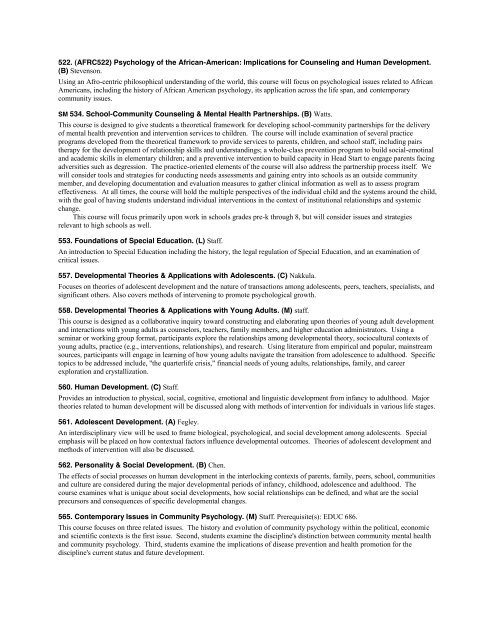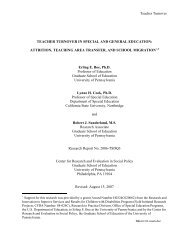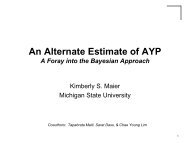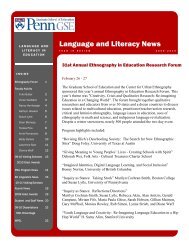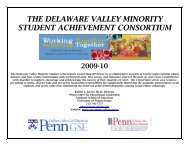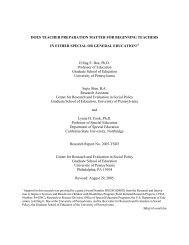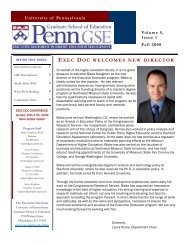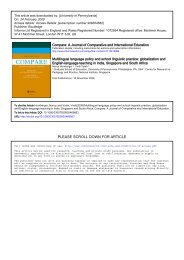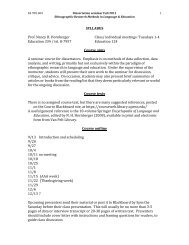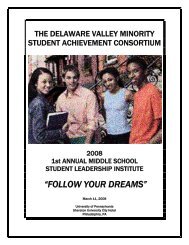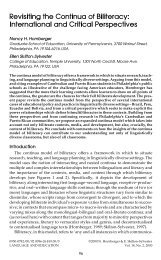EDUCATION (ED) {EDUC} - Penn GSE
EDUCATION (ED) {EDUC} - Penn GSE
EDUCATION (ED) {EDUC} - Penn GSE
You also want an ePaper? Increase the reach of your titles
YUMPU automatically turns print PDFs into web optimized ePapers that Google loves.
522. (AFRC522) Psychology of the African-American: Implications for Counseling and Human Development.<br />
(B) Stevenson.<br />
Using an Afro-centric philosophical understanding of the world, this course will focus on psychological issues related to African<br />
Americans, including the history of African American psychology, its application across the life span, and contemporary<br />
community issues.<br />
SM 534. School-Community Counseling & Mental Health Partnerships. (B) Watts.<br />
This course is designed to give students a theoretical framework for developing school-community partnerships for the delivery<br />
of mental health prevention and intervention services to children. The course will include examination of several practice<br />
programs developed from the theoretical framework to provide services to parents, children, and school staff, including pairs<br />
therapy for the development of relationship skills and understandings;; a whole-class prevention program to build social-emotinal<br />
and academic skills in elementary children;; and a preventive intervention to build capacity in Head Start to engage parents facing<br />
adversities such as degression. The practice-oriented elements of the course will also address the partnership process itself. We<br />
will consider tools and strategies for conducting needs assessments and gaining entry into schools as an outside community<br />
member, and developing documentation and evaluation measures to gather clinical information as well as to assess program<br />
effectiveness. At all times, the course will hold the multiple perspectives of the individual child and the systems around the child,<br />
with the goal of having students understand individual interventions in the context of institutional relationships and systemic<br />
change.<br />
This course will focus primarily upon work in schools grades pre-k through 8, but will consider issues and strategies<br />
relevant to high schools as well.<br />
553. Foundations of Special Education. (L) Staff.<br />
An introduction to Special Education including the history, the legal regulation of Special Education, and an examination of<br />
critical issues.<br />
557. Developmental Theories & Applications with Adolescents. (C) Nakkula.<br />
Focuses on theories of adolescent development and the nature of transactions among adolescents, peers, teachers, specialists, and<br />
significant others. Also covers methods of intervening to promote psychological growth.<br />
558. Developmental Theories & Applications with Young Adults. (M) staff.<br />
This course is designed as a collaborative inquiry toward constructing and elaborating upon theories of young adult development<br />
and interactions with young adults as counselors, teachers, family members, and higher education administrators. Using a<br />
seminar or working group format, participants explore the relationships among developmental theory, sociocultural contexts of<br />
young adults, practice (e.g., interventions, relationships), and research. Using literature from empirical and popular, mainstream<br />
sources, participants will engage in learning of how young adults navigate the transition from adolescence to adulthood. Specific<br />
topics to be addressed include, "the quarterlife crisis," financial needs of young adults, relationships, family, and career<br />
exploration and crystallization.<br />
560. Human Development. (C) Staff.<br />
Provides an introduction to physical, social, cognitive, emotional and linguistic development from infancy to adulthood. Major<br />
theories related to human development will be discussed along with methods of intervention for individuals in various life stages.<br />
561. Adolescent Development. (A) Fegley.<br />
An interdisciplinary view will be used to frame biological, psychological, and social development among adolescents. Special<br />
emphasis will be placed on how contextual factors influence developmental outcomes. Theories of adolescent development and<br />
methods of intervention will also be discussed.<br />
562. Personality & Social Development. (B) Chen.<br />
The effects of social processes on human development in the interlocking contexts of parents, family, peers, school, communities<br />
and culture are considered during the major developmental periods of infancy, childhood, adolescence and adulthood. The<br />
course examines what is unique about social developments, how social relationships can be defined, and what are the social<br />
precursors and consequences of specific developmental changes.<br />
565. Contemporary Issues in Community Psychology. (M) Staff. Prerequisite(s): <strong>ED</strong>UC 686.<br />
This course focuses on three related issues. The history and evolution of community psychology within the political, economic<br />
and scientific contexts is the first issue. Second, students examine the discipline's distinction between community mental health<br />
and community psychology. Third, students examine the implications of disease prevention and health promotion for the<br />
discipline's current status and future development.


